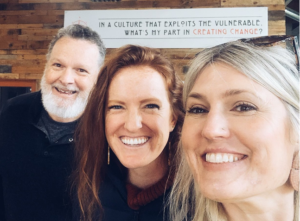Foster Alum Works to Fight Human Trafficking
Content Warning: This article contains descriptions of sex trafficking

Stephanie Dost | Hybrid MBA ’20
Stephanie Dost is a graduate of the Hybrid MBA Program, Class of 2020. Recently, in addition to her full-time job, she decided to get involved with a nonprofit organization. She is proof that what you learn in the Foster School classroom can be applied beyond the business and for profit setting, to issues surrounding human rights.
With her newly minted MBA in hand, Stephanie knew she could provide immediate impact to an organization and a cause she cared about by working with EPIK.
What is EPIK?
The Epik Project is a 501(c)3 and was founded in 2012 as a response to human trafficking (the horrific reality of people being bought and sold for sex against their will). Since then EPIK has become a national leader in the anti-trafficking movement. To date, EPIK has disrupted more than 200,000 attempts by over 100,000 active online sex buyers. What began in Portland has spread to cities across the country.
How does EPIK fight human trafficking?
EPIK is about mobilizing male allies to disrupt the commercial sex market, equipping them to combat the roots of exploitation and encouraging them to collaborate effectively with the wider anti-trafficking movement.
What drew you to working at EPIK?

Stephanie with EPIK coworkers
I wanted to take what I learned in Graduate School to a non-profit that supported a cause that I am passionate about. Ending human trafficking is one of those causes I care about and rather than just throwing money at the issue, I wanted to be an active part of the solution. I’ve served on a YWCA board and helped launch other non-profits, so this seemed like a very natural fit to align my skills with a major passion.
How do you see the intersection of EPIK and business principles?
EPIK takes a business approach to how it’s attacking the human trafficking problem in the United States through the basic economic principle of supply and demand. Without demand, the supply will dwindle. We often describe exploitation as a business system where men drive the demand. If there were no buyers, there would be no business.
EPIK takes a business approach to how it’s attacking the human trafficking problem in the United States through the basic economic principle of supply and demand. Without demand, the supply will dwindle.
In looking at the demand side of the equation, we need to increase the education of what it means to purchase sex. Often for the men who are looking to purchase sex, there is a lack of understanding that these are victims of the sex trafficking industry.
What is your role?
My role is to assist in the operations. I will craft projections, help with the board structure, identify key areas of need and help foster solutions. Through organizing their data, it will open up the ability for EPIK to increase their number of applications for grants and expand their program into new cities.
“The areas where they need help is exactly what I learned while at Foster.”
Foster MBA Difference
Stephanie’s work with EPIK is a true example of an alum living out the Foster School’s North Star. She’s using what she learned at Foster to better her community and ultimately, humanity.
Together…
We Foster Leaders
We Foster Insights
We Foster Progress
…To Better Humanity
To Learn More about the EPIK Project, visit https://epikproject.org/
To Meet More Hybrid MBA Students and Alums, visit https://blog.foster.uw.edu/tag/hybrid-mba-qa/
